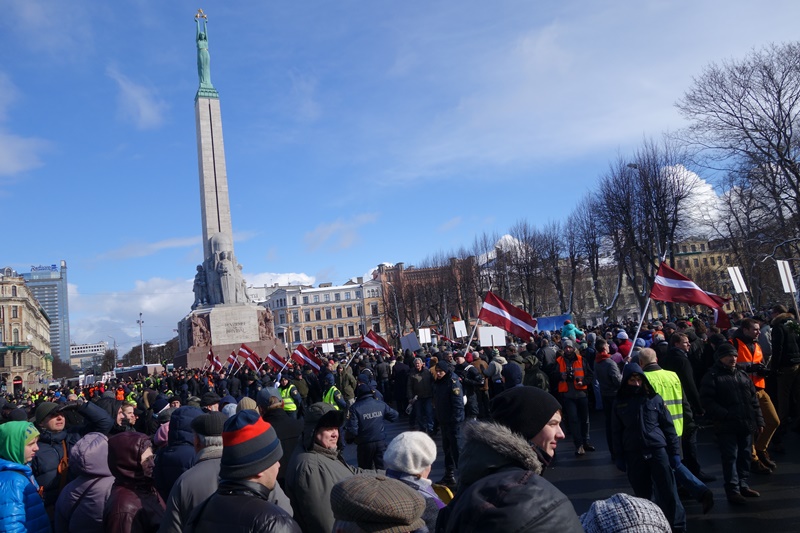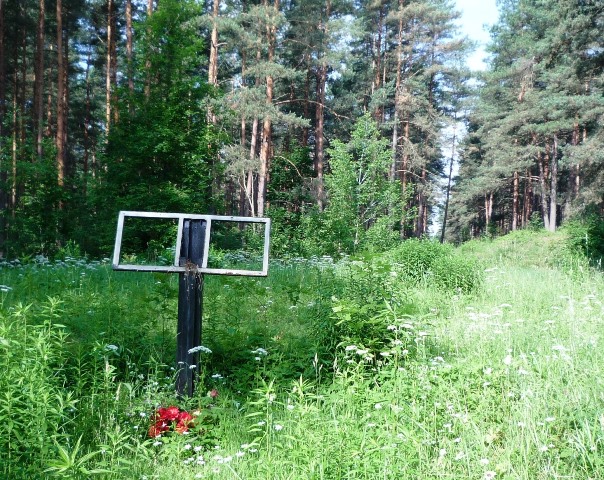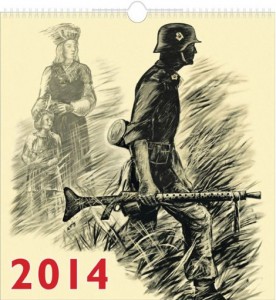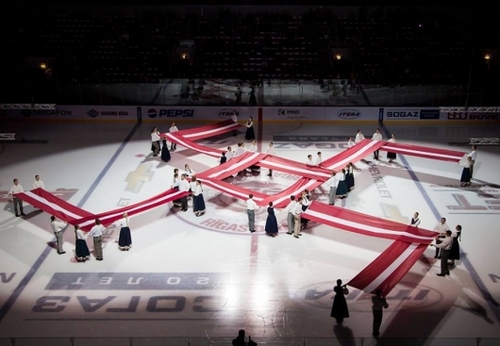Latvia
Latvian Parliament’s New “Double Genocide” Law:
A Jewish Tragedy (Flute and Composition)
M U S I C
by Roland Binet (Braine-l’Alleud, Belgium)
Starting in 2009, after my first visit in Riga, I became interested in the fate of the Jews in the Baltic States during the war. I returned several times to Latvia and also visited Estonia and Lithuania. In 2013 while in Riga, I went to see the Rumbula Memorial to see for myself what that well-known and fateful place looked like. That year in Vilnius, I visited the Ponár (Paneriai) memorial site, another of those well-known fateful places.
Latvian School Features “Judenfrei” Sign
The entrance to a nursery school in Latvia owned by a traditionalist lawmaker featured a German-language sign advertising the establishment as being “Jew-free.”
The posting of the sign, which reads “Judenfrei,” was revealed Monday by the Latvian daily Vesti Segodniya. The paper published a photo of the sign on the fence of the Pucite (“Owlet”) private school.
According to the Coordinating Forum for Countering Antisemitism, the establishment is owned by Imants Paradnieks, an ultranationalist Latvian lawmaker.
On Tuesday, Twitter users confronted him to ask whether the sign was genuine or just “a provocation.” He provided no reply, but wrote: “The Kremlin is full of jackals.”
The Riga-based school has a history of Nazi sympathies. In 2012, Pucite hosted two men dressed in Waffen SS uniforms, who held what they defined as “a lesson of patriotic upbringing” for the school’s early childhood program. A video of the lesson, which was uploaded to the nursery school’s website, showed two men encouraging 3-year-old children to play with World War II-era weapons.
2014 Baltic Marching Season Concluded
Interface of Pro-Fascist Marches, Holocaust Revisionism, and Contemporary Racism
EFRAIM ZUROFF IN THE HUFFINGTON POST, JERUSALEM POST AND TABLET
Summary Coverage of March 16th 2014 Waffen SS Event in Riga
Over 1500 March in Central Riga’s Annual March 16th Waffen SS Fest
MEDIA LINKS

Liberty Monument and the heart of Riga are again gifted to the glorifiers of Hitler’s Waffen SS in Latvia.
Continue reading
Summary Coverage in Run-Up to the 16 March 2014 Waffen SS March in Riga
Riga, Sunday March 16th 2014:
Could Riga (now the EU’s “Capital of European Culture”) Really be Allowing Yet Another City-Center Waffen SS Celebration on March 16th?
JUST IN:
BRITISH MEP RICHARD HOWITT ISSUES STATEMENT
MINISTER FACES SACK; FOR FIRST TIME, GOV SAYS: STAY AWAY
BALTIC TIMES: AGAIN SPEWING OUT NATIONALIST PR AS “REPORTING”?
MONICA LOWENBERG’S “SPEAK NO EVIL” (video); PETITION NEARS 7000
British MEP Richard Howitt, European Parliament Spokesperson on Human Rights, Issues Statement on Riga Waffen SS March
Richard Howitt, British Labour Member of the European Parliament, and spokesperson for the European Parliament Human Rights Sub-Committee today issued the following text of his statement which will be read out in Riga this Sunday March 16th.
Film Maker Attempts to Gift New Film on Riga Ghetto to Latvian Embassy in German
The following is the English translation, by Monica Lowenberg, of a letter sent today by German film maker Jürgen Hobrecht to the Latvian ambassador in Berlin.
Dear Mrs. Japina,
Riga, Capital of European Culture: Waffen SS, Stags and Silence?
O P I N I O N
by Monica Lowenberg
The UK’s home secretary Theresa May, the Hungarian Jobbik party, and Holocaust Memorial Day have all been in the press lately. Reading how the leader of pro-Nazi Jobbik party was, in the interests of free speech, allowed to hold his rally in Hyde Park, I have to question why Ms. May allowed this man entry into the UK and hadn’t called his racist attitudes, “unacceptable” as she had in the past with, “Every Muslim should be a terrorist” Zakir Naik. What had changed?
Aleksandrs Feigmanis Documents Mysterious Eight-Pointed Star in Riga Synagogue
 Following publication last year of an article on the mysterious eight-pointed star known from some old Jewish cemeteries in western Lithuania (the area known as Zámet in Yiddish, corresponding in part to Žemaitija), DH contributor Dr. Aleksandrs Feigmanis, director of Riga-based BalticGen Tours, has reported that a similar eight-pointed star adorns the (recently renovated) synagogue in Riga, Latvia. Hopefully, images will emerge of the prewar design corresponding to the reconstructed section in question.
Following publication last year of an article on the mysterious eight-pointed star known from some old Jewish cemeteries in western Lithuania (the area known as Zámet in Yiddish, corresponding in part to Žemaitija), DH contributor Dr. Aleksandrs Feigmanis, director of Riga-based BalticGen Tours, has reported that a similar eight-pointed star adorns the (recently renovated) synagogue in Riga, Latvia. Hopefully, images will emerge of the prewar design corresponding to the reconstructed section in question.
The Jewish Tragedy in the Baltic States
M U S I C
by Roland Binet (Braine-l’Alleud, Belgium)
THE AUTHOR’S MUSICAL COMPOSITIONS:
I War
II Ghetto
III The Killing Pits
IV Liberation
V Remembrance
Kaunas, Vilnius, Riga: Planned 2014 Neo-Nazi Marches (Summary Coverage to 26 Jan. 2014)
Kaunas, February 16th; Vilnius, March 11th; Riga, March 16th:
Will Lithuania’s President and Prime Minister Speak Out to Stop City-Centers on Independence Days Being Gifted to Neo-Nazis Again to Glorify the Holocaust’s Local Collaborators?
Last year, the president, prime minister and mayor failed to rise to the occasion of the neo-Nazi marches
Zabludoff’s Petition Nears the 3,000 Mark
First Stop — Kaunas on February 16th
World Union for Progressive Judaism “Fully Endorses” the Seventy Years Declaration (SYD)
LONDON—The World Union for Progressive Judaism released the following statement today, endorsing the Seventy Years Declaration (SYD). It also appears on the WUPJ website.
The news release, which was also circulated widely via the WUPJ’s emailed news reports, follows by half a year the SYD’s endorsement by Britain’s major Orthodox union, The United Synagogue, in the summer of 2013. [SYD text in European languages]
Latvian State Dance Troupe Displays Nazi Swastika
R E P O R T / O P I N I O N
by Graeme Atkinson (Hope Not Hate) and Monica Lowenberg (DefendingHistory.com)
Source: HOPE not hate/DefendingHistory.com Sunday, 24 November 2013.
“Baltic Times” Does It Again: A Page of Hate Calling for Expulsion of a Million Legal Residents in Latvia
O P I N I O N / M E D I A W A T C H
Last May, this journal reported on a full page of racial hate directed at Latvia’s “Russians” (a cover term for Russian-speakers of a multitude of backgrounds). It had appeared in the Baltic Times, under cover of the responsibility-shirking label “Advertisement.” Heaven help us all if the word advertisement can in European Union and NATO countries cover for spreads of hate and incitement to violation of human rights. In this case, the demand is for the veritable expulsion of a million peaceful, legal residents of a member state of these international alliances, both of which are based on the shared commitment to uphold the human rights of all.
Rather than repeat the commentary offered at the page’s earlier appearance, we refer back to it here on the occasion of its reappearance in this month’s Baltic Times (dated 31 October — 27 November 2013), that occupies all of page 5 in the main news (!) section.
Riga, Roots and Reflections
M E M O I R S / O P I N I O N
by Monica Lowenberg
In 2011, I made my first journey to Riga, the capital city of Latvia.
A few months before, I had been tracked down by two distant cousins on a genealogy site, quite out of the blue. I remember the strange feeling I had when one of them asked me if I felt “Latvian.” Latvian? German Christian, German Jewish, British, yes — but Latvian Jewish? No.
A Musical Tribute to the Rumbula Victims
M U S I C / O P I N I O N
by Roland Binet (Braine-l’Alleud, Belgium)
SOUND TRACKS OF THE AUTHOR’S COMPOSITIONS:
Rumbula
Threnody
Wiesenthal Center Blasts Latest Pro-Fascist Commemoration by Latvian Authorities
JERUSALEM—The Simon Wiesenthal Center today denounced the commemoration of the “liberation” of the Latvian city of Limbazi, sponsored by the Visu Latvija political party, a member of the ruling coalition in the nation’s parliament in Riga.
An Unmarked Holocaust Mass Murder Site in Riga, the Latvian Capital
INTERVIEW WITH RIGA HISTORIAN MEYER MELLER (MELERS)
by Aleksandrs Feigmanis
The great Russian author Lev Tolstoy wrote in his story “From the Notebook of Prince D. Nekhlyudov. Luzern.”
“Seventh July 1857 in Luzern in front of the Schweizerhof Hotel, where most rich people would stay the itinerant beggar-singer sings songs for half an hour and plays his guitar. About a hundred people heard him. Three times the singer asked the crowd to give him some money or food. Nobody gave him anything and many laughed at him.” […] This is the event which the historian of our times should write about with fiery irascible letters. This event is much more important and serious and has much more sense than the facts written in newspapers and history books. […] This is not a fact for the history of human acts, but for the history of progress and civilization.”

All that marks this major Holocaust mass grave in Riga, the Latvian capital, is a plastic bucket of flowers near the empty frame of a long-destroyed Soviet-era tin sign.
If you wish to see the mass grave take number 13 bus from the central station headed for Plavnieki and get off at the stop called Darzenu baze (roughly a half-hour ride). When you get off, turn from Lubanas street to the right until you come to Darzenu baze (“warehouse for vegetables”). In the pine woods some 300 meters from the warehouse you will see a little hill, without any mark, inscription or tombstone. Just a few primitive buckets of plastic flowers mark the site. They are placed near a wood frame stand that once, in Soviet times, held within it a bilingual tin sign about the site, that has long been destroyed and removed. The site is about 600 meters from the nine-floor apartment houses in Riga’s Plavnieki district.
Tone and Moral Judgment in a Famous Book on the Latvian Holocaust
B O O K S
by Roland Binet (Braine-l’Alleud, Belgium)
I became interested in the Holocaust in Latvia during my first visit there in 2009 and, above all, after having visited the Museum of the Jews in Latvia with its detailed exhibition of the tragedy that befell the Jewish population of that country. I had earlier read some books about the massacres that took place in Latvia between 1 July 1941 and the re-conquest of that country by the Red Army in 1944. Books written by survivors depicted a horrific environment including mass slayings, pogroms, denunciations, refusal of help for someone still alive. For those few who survived as slaves (roughly one out of ninety), there were living conditions far worse than what Dante could ever have imagined in his own time.
Thus, after a number of years, it was with great expectations that I began to read Andrew Ezergailis’s renowned book, The Holocaust in Latvia (first edition, 1996).[1]



